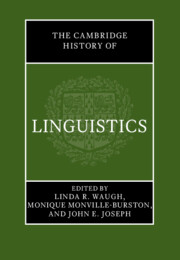Book contents
- The Cambridge History of Linguistics
- The Cambridge History of Linguistics
- Copyright page
- Dedication
- Contents
- Figures
- Tables
- Contributors
- Preface
- Acknowledgments
- Abbreviations, Acronyms, Special Symbols, and Other Conventions
- Introduction
- Part I Ancient, Classical, and Medieval Periods
- Part II Renaissance to Late Nineteenth Century
- Part III Late Nineteenth-through Twentieth-Century Linguistics
- Part IIIA Late Nineteenth Century through the 1950s: Synchrony, Autonomy, and Structuralism
- 13 Move to Synchrony: Late Nineteenth to Early Twentieth Century
- 14 Structuralism in Europe
- 15 British Linguistics
- 16 American Linguistics to 1960: Science, Data, Method
- Part IIIB 1960–2000: Formalism, Cognitivism, Language Use and Function, Interdisciplinarity
- References
- Index
13 - Move to Synchrony: Late Nineteenth to Early Twentieth Century
from Part IIIA - Late Nineteenth Century through the 1950s: Synchrony, Autonomy, and Structuralism
Published online by Cambridge University Press: 20 July 2023
- The Cambridge History of Linguistics
- The Cambridge History of Linguistics
- Copyright page
- Dedication
- Contents
- Figures
- Tables
- Contributors
- Preface
- Acknowledgments
- Abbreviations, Acronyms, Special Symbols, and Other Conventions
- Introduction
- Part I Ancient, Classical, and Medieval Periods
- Part II Renaissance to Late Nineteenth Century
- Part III Late Nineteenth-through Twentieth-Century Linguistics
- Part IIIA Late Nineteenth Century through the 1950s: Synchrony, Autonomy, and Structuralism
- 13 Move to Synchrony: Late Nineteenth to Early Twentieth Century
- 14 Structuralism in Europe
- 15 British Linguistics
- 16 American Linguistics to 1960: Science, Data, Method
- Part IIIB 1960–2000: Formalism, Cognitivism, Language Use and Function, Interdisciplinarity
- References
- Index
Summary
In their overview of how linguistics went from a historical to a predominantly synchronic study of language, the co-authors detail the essentials of the nineteenth-century historical-comparative ‘neogrammarian’ model and then analyze the main criticisms by: Bréal (e.g., his work La Sémantique and his recognition of the links between language, speakers, thought, and social life), Schuchardt and dialect geographers (geographic variation), Meillet and his sociological approach, Jespersen’s move to more systematic considerations, and the neolinguistic movement (Croce, Vossler), with its focus on individual creative expression.
The authors then turn to Saussure, his debt to many scholars (Paul, Gabelentz, Baudouin de Courtenay, Kruszewski, and Whitney) and his argument that the language system should be understood as coherent, that there is both synchrony and diachrony but synchrony is primary), that langue and parole should be differentiated, and that the speech community should be conceptualized as more heterogeneous than homogeneous. They conclude that the ‘move to synchrony’ meant a fundamental change in scope — such as the consideration of all levels of language, the role of the individual speaker in language — leading to general linguistics, the study of language as it is observed in the present, and his development of a powerful epistemological framework.
Keywords
- Type
- Chapter
- Information
- The Cambridge History of Linguistics , pp. 443 - 466Publisher: Cambridge University PressPrint publication year: 2023
- 2
- Cited by

